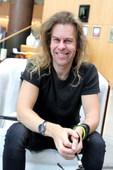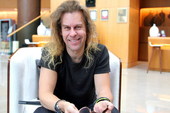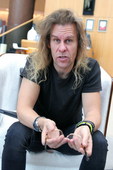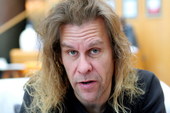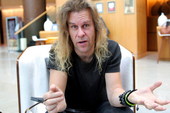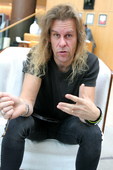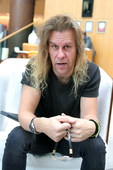Ulf Wadenbrandt
Big Mission For The Orchestra World
15.12.2017
Архив интервью | Русская версияOver the past couple of years this imposing blonde Swede gets to be seen more and more at conductor’s stands across Russia, so it’s only natural to have him again on our pages. But Russia isn’t the only country that welcomes Ulf Wadenbrandt, as in his native Sweden he has been appearing at events such diverse as a hard rock festival and at a gaming competition. Next year promises to be no less intensive for the conductor, with new symphony shows with Russia’s premier metal band Aria already announced and a lot of other projects in the making. We got to address a share of Ulf’s versatile activities in this interview for which we met at a hotel in downtown Moscow a couple of days before he performed in the Kremlin with yet another unexpected project…
This Sunday you will perform in the Kremlin with the “ABBA & Queen Symphony” show. Can you say a few words about how this idea came together? I mean, ABBA and Queen are quite different bands – whose idea was it to combine their songs in one single show?
From the beginning I was here in Moscow working with a Swedish piano player, and after that concert the manager of that concert said, “Please come here and start working with me. I have different programs, ABBA and Queen separately, but they want to mix it together. These are two very famous bands in Russia, let’s speak about putting them in a single show”. That’s why it’s like that. We think there will be lots of people in the audience this Sunday.
Would it be correct to say that classical music is a kind of bridge between rock and pop culture?
Yeah, it’s a perfect combination. I think it’s also a bridge for younger people to learn about orchestral music. And it’s also something fantastic to do for artists, because often this kind of music is done by a pop group with drums, bass, guitar, and synthesizers, but now it’s a full orchestra, it’s amazing! It’s such good music, and with good music you can do great arrangements for an orchestra. As I said, it’s a perfect combination.
You have performed in Russia many times. Do you remember your impressions from the very first visit to this country, and how much has the country changed since then?
I think I have been here for 2.5 years and done about 30-35 concerts here. I can say that I was really impressed by the country the first time I was here and I am still like that. It’s a really amazing country with very nice people and fantastic culture. I feel like it’s my second home. Soon first maybe, I don’t know.
When you come to a new country or city, what interests you first of all? Is it culture, is it architecture, is it people, or maybe local bands?
I think it’s people and culture. I am so eager to meet new people and learn things about culture. But I think it’s a mix of everything. Like with this interview, I meet you and it’s always interesting.
Next year you will have a new Russian tour with Aria. How much will it be different from the “Classical Aria” tour you did last time?
It will be a new program. I don’t know exactly the songs yet, but there will be some new Aria songs in it. I’m really looking forward to do the new program, but I also love the old one. The audience have taken it to their hearts, so I hope it will go on. I hope it will go on forever.
Is it true that you have a kind of exclusive relationship with Aria, meaning that you can’t work with other Russian metal bands, or is it more like rumors?
Have you heard that? (everybody laughs) I think it’s… I’m so honored to work with them, and I think it’s really hard to work with other bands at the same time. And I really like to work with them, and it’s a lot of work, so I have no time to do other things.
In your opinion, does Aria have chances to become famous in Europe, and if yes, what does it have to do to have a breakthrough outside Russia?
I think, definitely yes, they have. I’m sure this music will be loved by European fans, they just need to break through the wall somehow. I think it’s a matter of promotion. It can be a little bit about the language, most of the bands sing in English when it comes to Europe, and this is the band that sings in Russian. But I really think it’s possible, and the number of fans is growing. When I do concerts in Sweden, lots of people know about Aria. They like the music, they don’t know what the lyrics mean, but they like the sound of the lyrics. I think it’s a matter of having the right promotion, and I hope we can bring them to Sweden.
Speaking about Sweden, this year you performed at Sweden Rock Festival with an orchestra and such singers as Tarja Turunen, Joe Lynn Turner and John Lawton. Can you say a few words about that project? Who chose the songs and singers?
It’s my own symphony orchestra that was at the festival – the Sweden Symphony Orchestra that I’m the main conductor and the boss of. We spoke with Sweden Rock for two years about doing this show, and we spoke about what artists would be interesting do that with. It’s a collaboration between me and the bosses of this festival. We choose the artists, and we tell the artists what to do. Of course, if they say “yes”, it’s perfect, but if it’s “no”, then we go on and find the right songs. Every one of the artists was really excited to do this, and it was a huge success, really amazing. It’s fun to have different singers on this show, I think we had six singers.
Did you have an opportunity to walk around the festival? Was there anything or any band that caught your attention?
Oh, there was so much rehearsing. I also did interviews and other things, there was so much spotlight on this symphony thing, people were really interested in it. I didn’t have much time for walking around, but Aerosmith was there, and of course I liked them. We will go there again with the orchestra next year, and I hope there will be more time to listen to other bands. It’s a fantastic festival, very well organized.
I would like to ask you about your opinion about some famous rock / classical crossover albums. I mean, what you think about it, would you like to change anything in them if you had a chance, etc. The first one is Metallica’s “S&M”.
I think it was some sort of a breakthrough that got people looking at this kind of projects. Lots of people liked it. And I like it, I think it’s good. Metallica is not one of my favorites, but I like them.
The next one is Deep Purple’s “Concerto For Group and Orchestra”.
Yeah, that’s good! That’s more of my piece of cake, I like Deep Purple much more.
Kiss “Alive IV Symphony”
That’s also cool, I also like what they did to the faces of the symphony orchestra, yeah-yeah!
Rage “XIII”
Oh, I haven’t checked it out…
Then I strongly recommend you to do it, because it’s one of my favorites among these metal / classical crossover projects!
I will!
And the last one is Therion.
It’s Swedish!
Yeah, but what can you say about the way they combine heavy metal and classical elements in their music?
I think it’s really interesting. When you are good at heavy metal music, you have good skills for melodies. It’s a really great combination, and I think these guys really know what they are doing.
Another interesting project that you have been involved with this year is DreamHack Festival where you performed music from computer games. Are you a gamer yourself?
No, I’m not. But I’ve always been into movie music, “Star Wars”, “Jaws” and this kind of music, and I also like game music a lot. OK, I play “Angry Birds” and some kind of phone things, but in general, I’m not into playing, I’m into the music, it’s really good music. If I start playing these games, I think I will like them, but I never sit down and do it. I’m too busy doing other things. But it’s really interesting because this DreamHack festival is about 30,000 young people that meet for one or two weeks playing 24/7. I was very happy to be there. We have a big mission for the orchestra world to combine different styles, find a new audience, get new people to like orchestral music, so we need to do new things, to take new steps. For me it’s like a big experience. And when the music is fantastic, it’s just like "go for it”.
You come from a musical family. At what age did you realize that you want to be a musician, too?
I think at 12 or 15. I was into sports also, football and long-run skiing, I was really good at that, but not good enough, so I went for another thing that I was better at.
What kind of music attracted you first? Was it rock music or classical music?
Oh, it was rock music. The bands that were common back in the day – The Beatles, Rod Stewart, Kiss, this kind of soft rock music. The Beatles had a big impact on me. Then it became heavier with Deep Purple, Van Halen… there’s lots of music I liked, both pop and rock. Then I started studying, I went to classical school, and because you’re not allowed to play rock music in this classical school, I had to learn… not “had to learn”, I wanted to learn a classical instrument. Then suddenly there was conducting, and it went on from there. My perspective at life is that I want to do everything that tastes good. I don’t understand why people just do jazz or classical or rock music, I need to do everything. But we are different.
Your two daughters are musicians as well. Did you specifically want them to take up an instrument, or did happen naturally?
It happened naturally, I think. They have been at concerts with me, and they like violin. I also like violin, but I think it was their own choice. The most important thing was that they studied classical music, but they also do pop music, jazz music, they play everything. I tell them, “Don’t just do classical music, because if you want to work, you need to be able to do many things”. Now they play Daft Punk at home, if I’m lucky. (laughs)
Do you have any plans to cooperate with your daughters musically?
Yeah yeah. They already work in my orchestra, the Sweden Symphony Orchestra. My older daughter is there, and my younger daughter is there from time to time.
You will turn 50 years old next year. Does this date have any special meaning for you?
No, I don’t think so. Not at all. I just go on. Of course, people say it’s a big thing for them, they say that you start getting old when you’re 50. I don’t think it’s a big thing, I hope I’m still young. I feel so.
Some people say that after music became available online, there is much more music around, but not so much great music. Do you agree with it?
(pauses) I don’t know. I think there’s so much great music around, people just miss it. Now there’s music everywhere, but it’s sometimes hard to find it. You say there’s more music… It’s a tricky question. It was maybe easier to be a star before than it is now, a pop star or something – in the Western world, because I don’t know how it was in Russia. But we had The Beatles, ABBA, The Rolling Stones, Deep Purple, this kind of bands, and it’s not so easy to become a big star nowadays, because you have one hit, and then you go away. There’s a lot of skilled musicians everywhere…
But a skilled musician is not always the same as a great musician…
It’s true. Maybe we lost a little soul in it. Music is so easy to find everywhere. Back in the days when I was even younger than now, you needed to get an LP from a record store, which you wound visit once in only two or three weeks, and when you got this record, you were like, “Yeah, I’ve got this record, now who’s playing drums on it? Ah!” There was more waiting, like waiting for Christmas, and then there was this “yeaah”. Now it’s everywhere. Maybe we worked more before to find good music. It’s a tricky situation. There’s a lot of skilled musicians, but not everybody is great, because you need to be a little unique for that. I don’t know if it’s an answer to your question, it’s just my way of thinking.
The audience is becoming lazy…
Yeah, you can also see it in how people are playing instruments. Some people don’t want to waste hours and hours and hours on practicing, they are a little lazy, and that’s true for both musicians and the audience. You need to learn your craft to be this good, and I think it’s very important to be still thinking that way.
What was the latest band or artist that impressed you?
I don’t know. (pauses) I think I can say that I was really impressed by the guys in Aria the first time I met them, because there was so much soul in the guys, there was so much energy. Two of the guys have played together for 30 years, and two other guys for also a very long time, they are good musicians, and they’re having fun together, I was really impressed by the guys and how they work and how they are still hungry to do the things they do.
And what about younger bands? Aria are, in all honesty, not that young.
That’s why I said that I was impressed by them – it’s not so easy to keep your energy after so many years. It’s fantastic. With young guys, they should live on the edge, but when you have done it for a long time, it’s often going away. That’s why I’m so happy to see you, that’s why I’m so happy to be here, and I’m so happy to work with different artists, because I always need to live on the edge, I always need to be perfect, always need to do my best. And if I do the same thing every day, it will be boring. I will not be bored to see you every day, but you know what I mean. As to new bands… now my head is a little still, but of course I’m impressed by new musicians. There’s a Swedish band that I really love, and it’s not heavy metal. I don’t recall their name right now, but it’s fantastic. It’s some kind of funk thing.
What do you thing about electronic music? Are there any electronic bands that you like?
Electronic is a very broad term, electronic music for me is Depeche Mode, and that’s old. (laughs) Or do you mean classical electronic music? In general, I think it’s interesting to combine it with organic instruments. I’m open minded, I’m not into names and bands that do it, but I’m open-minded to it as well.
Your working schedule is very intense, with a lot of performances in different countries. How do you manage to find time for everything and be able to all these different projects?
I think I have worked with 10 different orchestras in two weeks. I just grab new scores at home and go to a new place. I have good organizers that help me, but this is a really crazy schedule that I have now. I don’t know, I’m just living it, and I don’t know anything else.
Is it a way of life?
Yes, it’s a way of life, and it’s natural – just open a new score and start reading and listen to the music on the plane. I like it. If I’m home and I don’t have anything to do, I get lazy.
Do you ever have time to listen to the music as a listener?
I mostly listen to the music I will do next day. If I do Queen tomorrow, I listen to Queen, if I do Aria, I listen to that. I also listen to music that my children play. I don’t listen too much for fun.
Well, I’m through with my questions. Could you say a few final words to our readers and your Russian audience?
I’m really honored to be doing this interview, and I’m really happy to have a lot of work in Russia. The Russian audience is very special, very good and very loyal to the bands and artists. I’m very happy to work in this country. It’s so big, full of nice people and good culture. It starts to grow on me a lot, so I hope to see them all at some concerts.
Some musicians say that the Russian audience is very emotion and a bit crazy, much like Brazilians, for instance. Do you agree?
Yes, it’s true. They’re much more emotional than in Sweden, the Nordic countries and Europe. They want to express what they feel, and I feel that they also want to tell it to the artist. That’s why I like to be here – because the audience is so nice and gives so much energy back. You know, we give energy, and we’re happy to get some of it back as well.
Ulf Wadenbrandt on the Internet: http://www.wadenbrandt.com
Special thanks to Natalia Stupnikova for arranging this interview
Interview and photos by Natalia “Snakeheart” Pastrashova
Questions also provided by Roman Patrashov
October 20, 2017
© HeadBanger.ru
